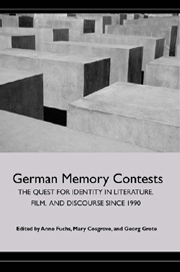Book contents
- Frontmatter
- Contents
- Acknowledgments
- Introduction: Germany's Memory Contests and the Management of the Past
- Positions
- Mediations
- 4 Being Translated: Exile, Childhood, and Multilingualism in G.-A. Goldschmidt and W. G. Sebald
- 5 “Ein Stück langweiliger als die Wehrmachtsausstellung, aber dafür reprüsentativer”: The Exhibition Fotofeldpost as Riposte to the “Wehrmacht Exhibition”
- 6 German Crossroads: Visions of the Past in German Cinema after Reunification
- 7 Monika Maron's Pawels Briefe: Photography, Narrative, and the Claims of Postmemory
- Ethnicity/Hybridity
- Memory Politics
- Works Cited
- Notes on the Editors and Contributors
- Index
7 - Monika Maron's Pawels Briefe: Photography, Narrative, and the Claims of Postmemory
from Mediations
Published online by Cambridge University Press: 05 February 2013
- Frontmatter
- Contents
- Acknowledgments
- Introduction: Germany's Memory Contests and the Management of the Past
- Positions
- Mediations
- 4 Being Translated: Exile, Childhood, and Multilingualism in G.-A. Goldschmidt and W. G. Sebald
- 5 “Ein Stück langweiliger als die Wehrmachtsausstellung, aber dafür reprüsentativer”: The Exhibition Fotofeldpost as Riposte to the “Wehrmacht Exhibition”
- 6 German Crossroads: Visions of the Past in German Cinema after Reunification
- 7 Monika Maron's Pawels Briefe: Photography, Narrative, and the Claims of Postmemory
- Ethnicity/Hybridity
- Memory Politics
- Works Cited
- Notes on the Editors and Contributors
- Index
Summary
Monika Maron's Pawels Briefe (Pavel's Letters, 1999) is one of numerous recent German-language texts that thematize the efforts of the so-called second generation, sons and daughters of Holocaust survivors and perpetrators, to uncover, reconstruct, and represent events that happened before they were born. The narrator of this autobiographical text seeks to piece together the biography of her grandfather, Pawel Iglarz, a Polish Jew who had converted to Baptism and emigrated with his wife Josefa to Berlin, where he worked as a tailor until the Nazi rise to power. In 1938 he was expelled from Germany. Offered the choice between divorce and expulsion, Josefa joined him the following year, and they settled in Kurow, Poland. In early 1942, he was deported to the Belchatow ghetto and thence to the concentration camp at Kulmhof (Chelmno), where he died, Josefa having predeceased him. While in Belchatow, Pawel exchanged a large number of letters with his family, and the discovery of these letters in 1994 triggers the process of reconstruction.
As Maron peruses the aforementioned letters, she realizes that she has never experienced her mother as somebody else's daughter. Her son Jonas, she adds, knows her both as a mother and as the child of his grandmother, but Maron herself has been denied this dialectic of familial continuity. As a result, she has no memories of her grandparents and creates an image of them retrospectively.
- Type
- Chapter
- Information
- German Memory ContestsThe Quest for Identity in Literature, Film, and Discourse since 1990, pp. 147 - 166Publisher: Boydell & BrewerPrint publication year: 2006



